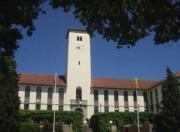
Rhodes University senior management will engage the Rhodes University students in a discussion hosted by the Rhodes University SRC today (19 March 2015 at 19:30) at Eden Grove Red, to respond to questions about what’s being done at Rhodes to transform the University.
The University has noted the hashtag RhodesSoWhite in the social media. Rhodes University encourages freedom of expression, debates and discussions on campus on any issue of interest or concern to students and/or staff.
The Vice-Chancellor noted in his inauguration speech when he outlined his vision for the University the following:
Institutional environment.
We must create and maintain an inclusive, welcoming, affirming and positive institutional environment.
We must, in the first instance, embrace diversity and celebrate difference. However, as an institution of higher learning we must go further than that and use the power of civil and reasoned argument, logic and debate to engage differences with a view to narrowing them, breaking new ground and enhancing and deepening shared understanding.
As Vice-Chancellor, I pledge to encourage and support freedom of expression and opinion and model practices and values that are consistent with the spirit and prescripts of our Constitution. We must, and will, respond with firmness and decisiveness to behaviours and attitudes that are divisive, hurtful and demeaning to others and which, sadly, still characterise much of our wider society.
Many of those engaged in these behaviours and attitudes may be unconscious of the effects of what they do because of the way they have been socialised into thinking their acts and thoughts are ‘normal’.
Through awareness-raising activities, we must challenge every single student and every single staff member to reflect on the way they interact with others in order to identify the hidden thoughts and attitudes underpinning the way they go about their daily lives.
In 1994, our country emerged from a great struggle against racism, hatred and inequality. Many lost their lives in that struggle. As a nation, we cannot afford to go backwards and, as a place of knowledge and an institution of higher learning, Rhodes University has to take a stand against any attempts to do so, however conscious or unconscious they may be.
Advancement of transformation at Rhodes
We have made significant progress in the transformation of the demographic and social composition of the student body. The ‘race’, class, gender, ethnic, national, linguistic, cultural and religious composition of our student population has changed and will continue to change given our imperatives of social equity and social justice.
However, similar levels of transformation have not been witnessed in our staff complement. In particular, it has been difficult to attract and retain Black academic staff.
Additionally, the paucity of Black and women academics in the higher ranks of the academy is a matter of great concern. We acknowledge our predicament and pledge ourselves to intensified efforts to transform our staff complement.
We must harness all efforts to create highly-attractive and welcoming environments and scholarly positions filled with academic richness, scope and promise and to follow this with purposeful investment in Black and women academics so that they are attracted to academic careers, that they are able to exceed their expectations, that they are able to rise through the academic ranks, and that they are able to assist in charting the future through their leadership. Such purposeful investment is exemplified in the 10-year old Accelerated Staff Development Programme funded by the Mellon Foundation and by the Kresge Foundation.
A number of our Black and women colleagues of academic influence and position bear witness to the programme and its impact. May their numbers, role and fine contribution to this University grow prodigiously, if not exponentially. A university characterised by ‘Business Unusual’ requires this.
Indeed, we welcome the initiative of the Department of Higher Education & Training to develop and train a new generation of academics for our higher education system. It is a matter of immense pride for us, as Rhodes University, that that initiative had its genesis in our own Accelerated Staff Development Programme.
Another significant area of transformation is the curriculum. As mentioned earlier, the social and demographic composition of our student body has changed significantly over the past number of years. The question which arises is: to what extent have we engaged our curricula and pedagogic approaches to respond to this diversity and to draw on the richness that it presents?
Are we still privileging and valuing knowledge from some parts of the world to the exclusion of that which comes from other parts of the world? Broadening the content to embrace knowledge from different parts of the world is just one part of curriculum transformation. Another important part is the pedagogic philosophy and approach adopted to accommodate and leverage on the diversity of our student population.
As academics, do we see that the students who sit in front of us in the lecture and seminar rooms of our campus are different to those who sat beside us when we were students? Have we adapted our pedagogical approaches to ensure that every one of those students is included as an equal in the learning that goes on in our classrooms? Does our approach to diversity of participation, and to diversity of knowledge, assist our graduates to provide leadership for a more sustainable and resilient society? These are the kinds of questions we need to be asking as we move forward into a more equitable future.
